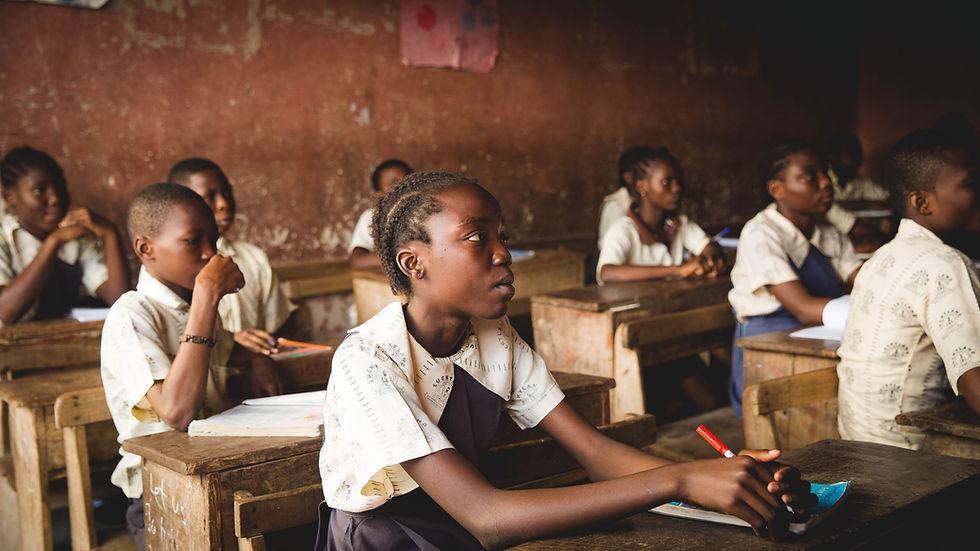Can Germany Save Africa?
- JMBR

- Nov 22, 2017
- 3 min read
Updated: Apr 13, 2022
By Mathilde Ngo Mbom

How Germany is Reforming Foreign Aid Policies to African Countries to Improve their Effectiveness.
On April 11, 2017, the Organisation for Economic Co-operation and Development (OECD) reported that official development assistance (ODA) to developing countries from its 35 member countries amounted to the cumulative sum of US$ 2.9 trillion from 1950 to 2016. While the ODA is supposed to promote the economic development and welfare of developing countries, some development economists such as Friedman Prize recipient Peter Bauer see the program as "a transfer of wealth from poor people in rich countries to rich people in poor countries." The effectiveness of the ODA especially in Africa, the world’s poorest continent, is not a new topic. Various donor countries and organizations are working tirelessly to develop new ways to make Africa more economically independent. Among the most recent and ambitious plans to save Africa is the Marshall Plan with Africa, proposed by Germany.
What is the Marshall Plan with Africa?
Inspired by the Marshall Plan, a US-sponsored US$ 130 billion economic initiative that helped rebuild Western Europe after the Second World War, the Marshall Plan with Africa was released as a draft document on January 3, 2017 by the Federal Ministry for Economic Cooperation and Development (BMZ). One of the main advocates of this plan, German Development Minister Gerd Mueller, asserted that the plan could be as successful for Africa as it was for Germany, fostering sustainable growth and eventually a better economic future for the continent. The plan entails investment in youth, education, training and effective law enforcement. Germany and Africa would transition from a donor-recipient relationship to a business partnership where Germany would help realize Africa’s economic potential using economic tools that have been proven successful in many Western countries.

What could the plan accomplish and how would it be done?
In order to help Africa become economically independent, the draft lists an exhaustive inventory of actions that could potentially lead to their economic independence. These actions will require the full participation of Germany, other Western countries, and most importantly, African countries. For example, the “pan-European effort” would implement three bilateral development initiatives costing up to € 300 million in selected countries. If successful, the collaboration would help the African private sector create more jobs and income for young Africans. Moreover, Germany aims to increase tax revenues in Africa which, according to the OECD Centre for Tax Policy and Administration, account for less than 20% of the continent GDP compared to over 30% in OECD countries. This outcome would mean training African tax authorities, closing tax loopholes, and eliminating international tax havens. In addition, the plan is expected to increase domestic trade in Africa and promote fair foreign trade between Africa and the other regions, resulting in a win-win relationship between Africa and the rest of the world.
How could the plan fail?
Like any ambitious goal, the German effort brings mixed reactions across the world. Jacob Kahenya, a political scientist in Kenya, argues that the pact will fail because it lacks a country-specific approach rather than a one-size fits all solution for all countries. An example of this would be the pact’s failure to acknowledge the economic differences between African countries, possibly leading to the strategy succeeding in some countries and not others. Historically, there have also been cases of foreign aid pledges that were in fact concealed attempts of private sector exploitation. This was seen through a German television expose of an investor who rescinded on their promise to invest in the improvement of a Zambian town’s economic condition. Private investors often treat aid as a business venture, with analysts like Jane Nalunga, a trade expert at the Alternative G20 summit in Hamburg, arguing that Germany and other Western countries involved in the Plan would expect a return on their investment.
Finally, it is not the first time such a program was implemented in Africa without much success. In 2005, then UK Prime Minister Gordon Brown proposed various initiatives such as debt cancellations, boosting direct aid payments, and eliminating trade subsidies in rich countries. However, implementation did not necessarily result in a turnaround for certain countries. For example, the UK Department for International Development reported in 2016 that some of the largest recipients of UK aid such as Nigeria, the Democratic Republic of Congo, and Kenya, still failed to meet some targets of the Millennium Development Goals, including the eradication of extreme poverty and hunger, and achieving universal primary education.

What’s Next?
It is yet to be determined whether the Marshall Plan with Africa will be a success as the program is still in the consultation process which began earlier this year. The plan will also be further discussed at the EU-Africa Summit this month. However, the success of the plan would be detrimental to Western nations that were dominant partners in donor-recipient relations with many African nations.






